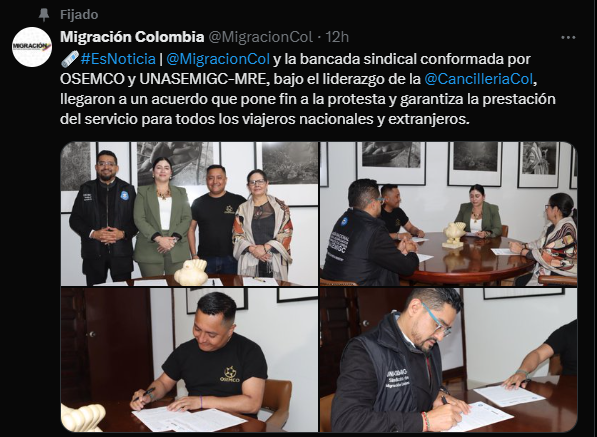Colombia’s Migration Workers Reach Historic Deal, Strike Officially Over
Migración Colombia and the workers’ unions of the entity reached an agreement on Thursday, December 5, ending the strike that began on Tuesday. The protest, which implemented a «go-slow» operation at airports, disrupted migratory flow during one of the busiest air traffic seasons of the year.
On its official X account, Migración Colombia announced the end of the strike following negotiations with the Unión Nacional Sindical de Empleados de Migración Colombia y Ministerio de Relaciones Exteriores (Unasemig) and the Organización Sindical de Empleados de Migración Colombia (Osemco). According to the agency, the agreement ensures the provision of services for national and international travelers, although specific details of the terms reached were not disclosed.
For their part, the unions emphasized that the agreement includes salary improvements, the hiring of 544 new employees for 2025, and a commitment to conduct a study for the reengineering of the entity. “This is a historic moment for the workers of Migración Colombia and the Ministry of Foreign Affairs,” stated Yeison Mesa, president of Osemco.

The strike, which began on December 3, coincided with the implementation of “Mission Christmas”, a strategy designed to ensure operational efficiency during the holiday season. According to the Civil Aviation Authority, a 13% increase in air traffic was projected between November 2024 and January 2025, with over 3.2 million passengers expected to travel. In a statement, the unions had noted that their demands included balancing workloads, salary improvements, and addressing a hostile work environment that affects workers’ mental health. They also criticized what they described as a lack of tangible progress after multiple meetings with government representatives.
During the strike, the implementation of the «go-slow» operation caused delays in migratory processes, particularly in international flights. Authorities and organizations such as the Latin American and Caribbean Air Transport Association (ALTA) expressed concern over the impact on users, connectivity, and tourism.
Reactions and Mitigation Measures
Foreign Minister Luis Gilberto Murillo, who led the dialogue sessions, emphasized that the negotiations ensured better working conditions for employees and strengthened the technical capabilities of the entity. “Dialogue will always be the way forward. We recognize the fundamental role of Migración Colombia workers in migratory control and in boosting tourism,” said Murillo.
Although the agreement ends the strike, the unions stressed the importance of fulfilling the commitments made to avoid future conflicts. The achievements, including the increase in personnel and the reengineering of the entity, are considered significant steps toward improving working conditions and operational efficiency at Migración Colombia.

/https://aviacionlinecdn.eleco.com.ar/media/2022/01/Bogota-El-Dorado-pasajeros-generica.jpg)
Para comentar, debés estar registradoPor favor, iniciá sesión